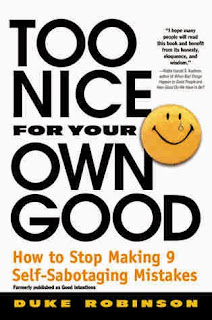Advice from The book “Too Nice for Your Own Good” by Duke Robinson
You are always trying to do what others expect from you, and you are careful not to hurt their feelings. You run to help friends and relatives whenever they need you and avoid disappointing them even if they provoked you, then you are a too nice person and you love and care that people describe you so.
However, if you contemplated your “nice” attitude, you will discover that it is often a behavior of 'defeatism' if you say yes when you should say no, or when you pretend to be calm when you feel resentment or anger, or when you resort to lying because you fear hurting the feelings of others. You may bear burden over you can handle so as not to embarrass the people dear to you. That is in order to for you to maintain dealing with others nicely you commit many errors that may affect you in a negative way, your business, or social relationships.
One of the biggest mistakes a nice person makes is a tendency to perfection, which imposes great pressure on him/her. It requires a strenuous effort to prove oneself, and to do various tasks to the fullest, as well as the continuous attempts to satisfy others. We must clarify here that trying to reach for perfection in itself is not a problem, but it becomes a mistake when it pushes you to develop unrealistic standards for yourself, or overburden you in terms of effort, time, or money, or when it becomes an obsession to the point of hindering your performance for your business.
The first step to correct this is to have faith (and not just repeating words) that nobody is perfect, and to fully accept the shortcomings you have. After that comes the realization that perfection is not the only way to acquire the acceptance of others.
Beside the tendency for perfection, Duke Robinson summarizes in his book “Too Nice for Your Own Good” other errors that nice people do on a daily basis which are:
Mistake # 1: Taking greater commitments than you can handle: sometimes too much kindness can put you in trouble. Whether saying no to someone dear to you asking you for something makes you feel selfish and guilty, or trying to do whatever you are asked to do that drains your energy.
Mistake # 2: Not saying what you want: You may do so because you might think it is socially inappropriate, or you do not want to appear as weak, or you might be afraid of rejection or do not want to cause embarrassment to those you love. In any case, not disclosing your feelings, your requirements and suppressing what you want for the sake of others may lead you to a mental illness and may dissipate as the features of your personality.
Mistake # 3: Suppressing your resentment: the intention here is to keep your nerves calm while you boil inside as a result of the exploitation of others to you or abusing you or your feelings, which is a kind of forgery and lying to oneself and others. The call for not to suppress your resentment never means to arise like a volcano. All you have to do is to show to others that such conduct is harassing you so as not to repeat it again.
Mistake #4: Escaping from the truth: In order to be nice, you often shy away from telling the truth in order not to embarrass others but this does not either benefit them nor you. You have to tell the truth with humility and sensitivity. For example, if your wife asked you what do you think about the potatoes dish you didn’t like, you do not have to lie and say it was fantastic, there is no need also to be rude and say it was bad, but you can answer that you usually like the potatoes she makes, but its taste at this time was a little bit different. And so you get out of the situation with minimal losses.
Getting rid of the previous minor mistakes does not mean to stop being nice, but only helps us to rationalize the extra effort you try to make to be nice at all times and that often comes at the expense of your nerves and your comfort. So it is just a matter of balance to keep and maintain your mental well being, emotional and social health. If you do not suffer from being “too much nice”, you may continue reading other articles in this blog :)
Recommended for reading
Article was helpful? Share with friends!












0 comments:
Post a Comment